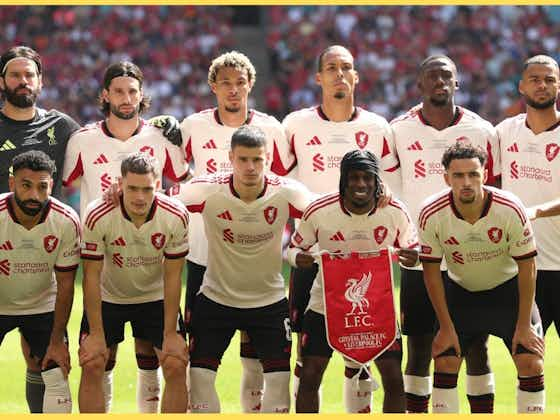Liverpool’s Community Shield Disappointment: Analyzing Salah’s Struggles and Season Implications

For Liverpool Football Club and their passionate supporters, Wembley Stadium has become a venue of mixed emotions in recent years. The iconic arch that stretches across North London has witnessed both triumph and heartbreak for the Reds, and on this particular Community Shield afternoon, it was the latter that dominated proceedings. For the second time in 2025, Liverpool departed the home of English football with heads hung low, having fallen short in a major final. This latest setback, a 3-2 penalty defeat to Crystal Palace, added another layer of disappointment to what had been an otherwise promising pre-season under new manager Arne Slot.
The Community Shield, while often dismissed as a glorified friendly by some, carries significant psychological weight at the start of a new campaign. It represents the first opportunity for teams to lay down markers, to demonstrate that they are ready for the challenges ahead, and to build momentum heading into the Premier League season. For Liverpool, who entered the match as defending English champions, the expectation was clear: demonstrate that despite the managerial transition from Jurgen Klopp to Arne Slot, the winning mentality and quality remained intact.
What transpired, however, was a tale of missed opportunities, defensive lapses, and individual performances that fell short of the standards expected at Anfield. While the result itself may quickly fade from memory once the Premier League campaign begins in earnest, the manner of the defeat and certain individual displays have raised questions about Liverpool’s readiness for the demanding season ahead.
Liverpool’s Community Shield encounter with Crystal Palace was a microcosm of football’s unpredictable nature. The Reds, buoyed by pre-season optimism and the fresh tactical approach of Arne Slot, began the match with intent and purpose. The early stages suggested that Liverpool had successfully navigated the transition period and were ready to pick up where they left off as Premier League champions.
The opening goal, scored by debutant Hugo Ekitike, demonstrated the kind of clinical finishing that had become synonymous with Liverpool’s attacking play. The French striker’s composure in front of goal suggested that the new arrivals were already adapting to the demands of English football and the specific requirements of Slot’s tactical system. For a moment, it appeared that Liverpool’s summer business had addressed the areas that needed strengthening.
However, football rarely follows a script, and Crystal Palace proved to be far from willing participants in Liverpool’s coronation. The Eagles, who had already tasted success at Wembley earlier in the year with their FA Cup triumph, showed the kind of resilience and tactical discipline that has made them such awkward opponents for top-flight teams. Their response to falling behind was immediate and emphatic, suggesting that manager Oliver Glasner had instilled a mentality that thrived under pressure.
The second Liverpool goal, courtesy of another debutant in Jeremie Frimpong, temporarily restored the narrative of Liverpool dominance. The Dutch defender’s strike showcased the attacking threat that full-backs can provide in modern football, and his celebration with the travelling supporters suggested that he had quickly grasped the emotional connection between players and fans that makes Liverpool such a unique club.
Yet, for all of Liverpool’s quality in attack, defensive frailties began to emerge as the match wore on. Crystal Palace’s equalizers were not flukes or moments of individual brilliance from the opposition, but rather the result of systematic breakdowns in Liverpool’s defensive structure. These lapses in concentration and organization would prove costly, as the match eventually headed to penalties after neither side could find a winner in regular time.
Among all the storylines that emerged from Liverpool’s Community Shield defeat, none generated more discussion than the performance of Mohamed Salah. The Egyptian superstar, who has been the cornerstone of Liverpool’s attacking threat for several seasons, endured what can only be described as an afternoon to forget at Wembley. His display was so uncharacteristically subdued that it prompted immediate analysis from pundits and fans alike, with many questioning whether this performance was an anomaly or a sign of deeper concerns.
James Savundra of Sky Sports News captured the sentiment of many observers when he described Salah’s performance as “anonymous,” a damning assessment for a player who has built his reputation on being a constant threat and game-changing presence. The use of such terminology is particularly significant when applied to a footballer of Salah’s caliber, as it suggests not just poor execution but a complete absence from the match’s crucial moments.
The statistics paint a stark picture of Salah’s struggles throughout the ninety minutes. His rating of 4.7 on Sofascore represents a career low for the Egyptian in a Liverpool shirt, a numerical representation of a performance that fell well short of his usual standards. More concerning than the overall rating, however, were the specific areas where Salah failed to make his mark on the match.
The fact that Salah lost all six duels he contested is particularly alarming for a player whose game has evolved to include more physical battles with defenders. Throughout his Liverpool career, Salah has shown an ability to hold his own in one-on-one situations, using his low center of gravity and quick feet to evade challenges and create space. On this occasion, however, he appeared to lack the sharpness and determination that has made him such a formidable opponent
His passing accuracy of just 65% (13 successful passes from 20 attempts) suggests a player who was either rushing his decisions or struggling to find teammates in advantageous positions. For a player who has developed into one of the most intelligent attackers in world football, this level of imprecision is unusual and concerning. The inability to complete a single successful dribble is perhaps even more troubling, as this has been one of Salah’s signature attributes since arriving at Liverpool.
The twelve times Salah lost possession during the match represents a level of carelessness that is uncharacteristic of his usual play. While all attacking players will inevitably surrender the ball as they attempt to create chances and beat defenders, the frequency with which Salah gave away possession suggests a player who was not fully in sync with the flow of the match.
If Salah’s performance during the regulation ninety minutes was disappointing, his penalty miss in the subsequent shootout was nothing short of devastating. Stepping up to take the first spot kick for Liverpool, with the weight of expectation from thousands of travelling supporters behind him, Salah faced a moment that could have redeemed an otherwise forgettable afternoon.
The psychology of penalty taking at Wembley carries additional pressure beyond that of a regular shootout. The famous stadium, with its vast expanses and iconic arch, can feel overwhelming even for experienced professionals. The knowledge that millions of viewers around the world are watching, combined with the immediate presence of passionate supporters, creates an atmosphere that can either inspire greatness or induce paralysis.
For Salah, who had missed a penalty in similar fashion during a pre-season friendly against Athletic Bilbao just days earlier, the pressure must have felt immense. The fact that he was taking the penalty in front of the Liverpool supporters added another layer of complexity to the situation. These were the fans who had sung his name through countless matches, who had celebrated his goals and achievements with unbridled joy. Now, with the Community Shield potentially hanging in the balance, they looked to their hero to deliver once more.
The execution, however, was far from heroic. Salah’s penalty sailed high over the crossbar, a miss so emphatic that it seemed to encapsulate all the frustration and confusion of his overall performance. The reaction from the Liverpool supporters was one of stunned disbelief, while Salah himself appeared to be grappling with the magnitude of his error.
This penalty miss was particularly significant because it echoed his earlier failure from the spot against Athletic Bilbao. For a player of Salah’s experience and mental strength, to repeat the same mistake in such a short timeframe suggests that there may be underlying issues with his confidence or technique from twelve yards. The fact that both misses were high over the crossbar points to a specific technical problem that may require immediate attention from the coaching staff.
To fully understand Salah’s struggles in the Community Shield, it’s essential to examine the tactical context within which he was operating. Arne Slot’s system differs significantly from the approach favored by previous manager Jurgen Klopp, and this transition period may be affecting certain players more than others.
Under Klopp’s management, Salah thrived in a system that emphasized rapid transitions, high pressing, and direct attacking play. The German manager’s tactical setup was designed to maximize the pace and movement of Liverpool’s front three, with Salah often finding space through carefully orchestrated runs behind opposition defenses. The relationship between Salah and his teammates, particularly the understanding with players like Sadio Mane and Roberto Firmino, was built over several seasons of working within this specific framework.
Slot’s approach, while sharing some similarities with Klopp’s philosophy, places greater emphasis on positional play and controlled possession. This subtle shift in tactical approach may be requiring Salah to adapt aspects of his game that have become second nature over the past several seasons. The process of tactical evolution is rarely seamless, and even the most talented players can experience periods of adjustment as they adapt to new expectations and responsibilities.
The introduction of new teammates, including debutants Hugo Ekitike and Jeremie Frimpong, further complicates this adaptation process. The chemistry and understanding that exists between attacking players is built through countless hours of training and competitive matches. When new personnel are introduced, existing relationships must be recalibrated, and this process can temporarily disrupt the fluidity of attacking play.
Salah’s struggles to create key passes and successful dribbles may reflect this period of tactical and personnel adjustment. His positioning and movement patterns, so finely tuned under the previous system, may require modification to suit Slot’s preferences. This adaptation process could explain why a player of Salah’s quality appeared so disconnected from the match’s flow
When evaluating Salah’s Community Shield performance, it’s crucial to maintain perspective by considering his remarkable track record over recent seasons. The Egyptian’s 2024/25 campaign was nothing short of spectacular, with 34 goals and 23 assists representing output that few players in world football can match. These statistics demonstrate not just individual brilliance but also a consistent ability to influence matches across an entire season.
Salah’s habit of scoring on the opening weekend of Premier League seasons has become something of a tradition at Liverpool. This psychological edge, where the Egyptian seems to relish the opportunity to set the tone for the campaign, suggests that he performs best when the stakes are highest and the scrutiny most intense. The Community Shield, for all its prestige, may not carry the same motivational weight as a Premier League fixture with three points on the line.
Throughout his Liverpool career, Salah has demonstrated remarkable resilience in bouncing back from disappointing performances. The mental strength required to consistently perform at the highest level is one of his most underrated attributes, and this psychological robustness has been evident in his ability to respond to criticism and setbacks with improved performances.
The Egyptian’s professionalism and dedication to continuous improvement have been praised by teammates and coaches alike. His work ethic in training and commitment to physical conditioning have allowed him to maintain peak performance levels well into his thirties, an age when many forwards begin to show signs of decline. This foundation of professionalism suggests that any current struggles are likely to be temporary rather than indicative of long-term problems.
While one disappointing performance should not overshadow Salah’s overall contribution to Liverpool’s success, the timing of this display does raise important questions about the team’s readiness for the upcoming campaign. The Community Shield represents the final opportunity for teams to test themselves against quality opposition before the Premier League season begins, making individual and collective performances particularly significant.
Liverpool’s defensive vulnerabilities, exposed by Crystal Palace’s comeback, suggest that Arne Slot still has work to do in organizing his team’s structure without the ball. The ability to maintain leads has been crucial to Liverpool’s success in recent seasons, and any weakness in this area could prove costly when facing the relentless pressure of Premier League competition.
The performance of debutants like Ekitike and Frimpong provides cause for optimism, demonstrating that new signings can quickly adapt to the demands of playing for Liverpool. However, the integration of these players into the existing squad dynamics will require careful management to ensure that team chemistry is not disrupted.
Salah’s struggles may also reflect broader concerns about Liverpool’s attacking patterns under their new manager. If the Egyptian, who has been the focal point of the team’s forward play for several seasons, is struggling to adapt to new tactical demands, it may indicate that other players are experiencing similar challenges. The coaching staff will need to work closely with key players to ensure that tactical transitions do not compromise individual performances.
The psychological aspects of elite football performance cannot be underestimated when analyzing Salah’s Community Shield display. The pressure of playing for a club like Liverpool, combined with personal expectations and external scrutiny, can affect even the most experienced professionals in unexpected ways.
Salah’s status as Liverpool’s talismanic figure brings both advantages and burdens. While his reputation can intimidate opponents and inspire teammates, it also creates enormous pressure to perform in every match. The weight of expectation from supporters, media, and the player himself can sometimes result in the kind of overthinking that leads to poor decision-making and reduced effectiveness.
The transition to a new manager adds another layer of psychological complexity. Players who thrived under previous systems may experience anxiety about their role and importance in the new setup. This uncertainty can manifest in hesitant play and reduced confidence, potentially explaining some aspects of Salah’s subdued performance.
The penalty miss, coming so soon after a similar failure in pre-season, may have created a negative psychological cycle where doubt begins to creep into what was previously an automatic response. Elite athletes often describe how confidence can evaporate quickly once doubt enters their mind, and penalty taking is particularly susceptible to these mental fluctuations.
Despite the disappointment of the Community Shield defeat and Salah’s individual struggles, there are numerous reasons for optimism as Liverpool prepares for the new season. The club’s history is filled with examples of players and teams bouncing back from disappointing results to achieve great success, and the current squad possesses the quality and character necessary for such a recovery.
Salah’s track record of responding positively to criticism and setbacks suggests that this performance may serve as motivation rather than a source of lasting concern. The Egyptian has consistently demonstrated the mental fortitude required to overcome adversity, and his professionalism in training and preparation provides a solid foundation for improvement.
Arne Slot’s tactical approach, while still in its implementation phase, shows promise for enhancing Liverpool’s overall performance levels. The Dutch manager’s emphasis on controlled possession and positional play could ultimately provide Salah with even more opportunities to influence matches, once the initial adaptation period is complete.
The support structure at Liverpool, including sports psychologists, tactical analysts, and experienced coaches, is well-equipped to help players navigate challenging periods. The club’s investment in these support systems reflects an understanding that elite performance requires attention to all aspects of player development, not just physical and technical training.
As Liverpool prepares to defend their Premier League title, the Community Shield defeat and Salah’s disappointing performance serve as important reminders that success cannot be taken for granted in elite football. However, they should also be viewed within the broader context of the club’s ambitions and the individual quality within the squad.
One poor performance, regardless of the stage on which it occurs, does not define a player’s ability or predict future success. Salah’s remarkable consistency over recent seasons has earned him the benefit of the doubt, and his commitment to improvement suggests that this setback will be temporary.
For Liverpool as a whole, the Community Shield experience provides valuable lessons about the work still required under their new manager. The defensive vulnerabilities and tactical adjustments needed are challenges that can be addressed through continued training and development.
The true test of both Salah and Liverpool will come when the Premier League season begins and points are genuinely at stake. History suggests that both the player and the team are well-equipped to meet these challenges and deliver the kind of performances that their supporters expect and deserve. The disappointment of Wembley may ultimately prove to be the catalyst for an even more determined and successful campaign ahead.















